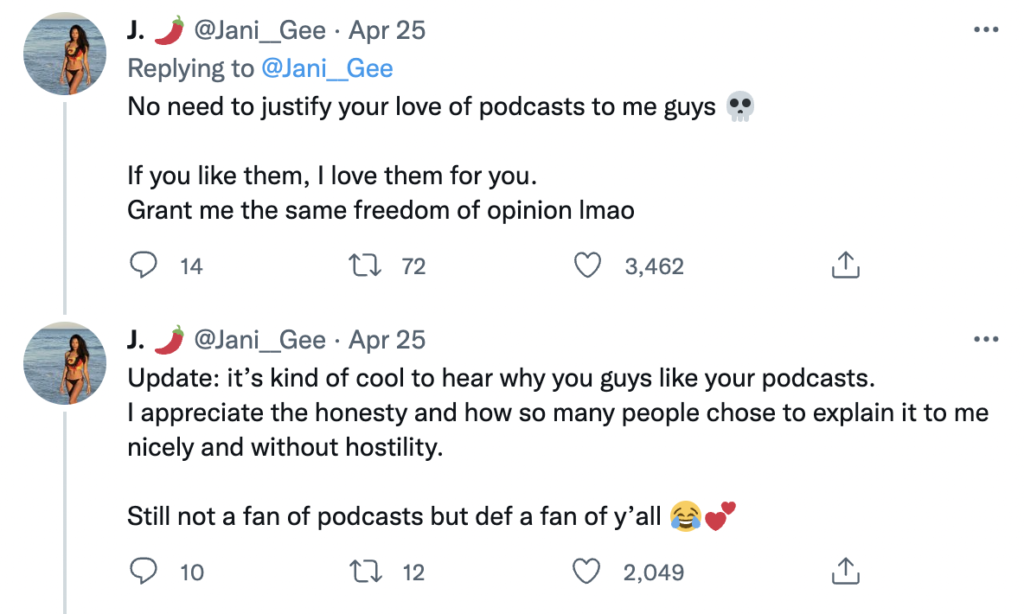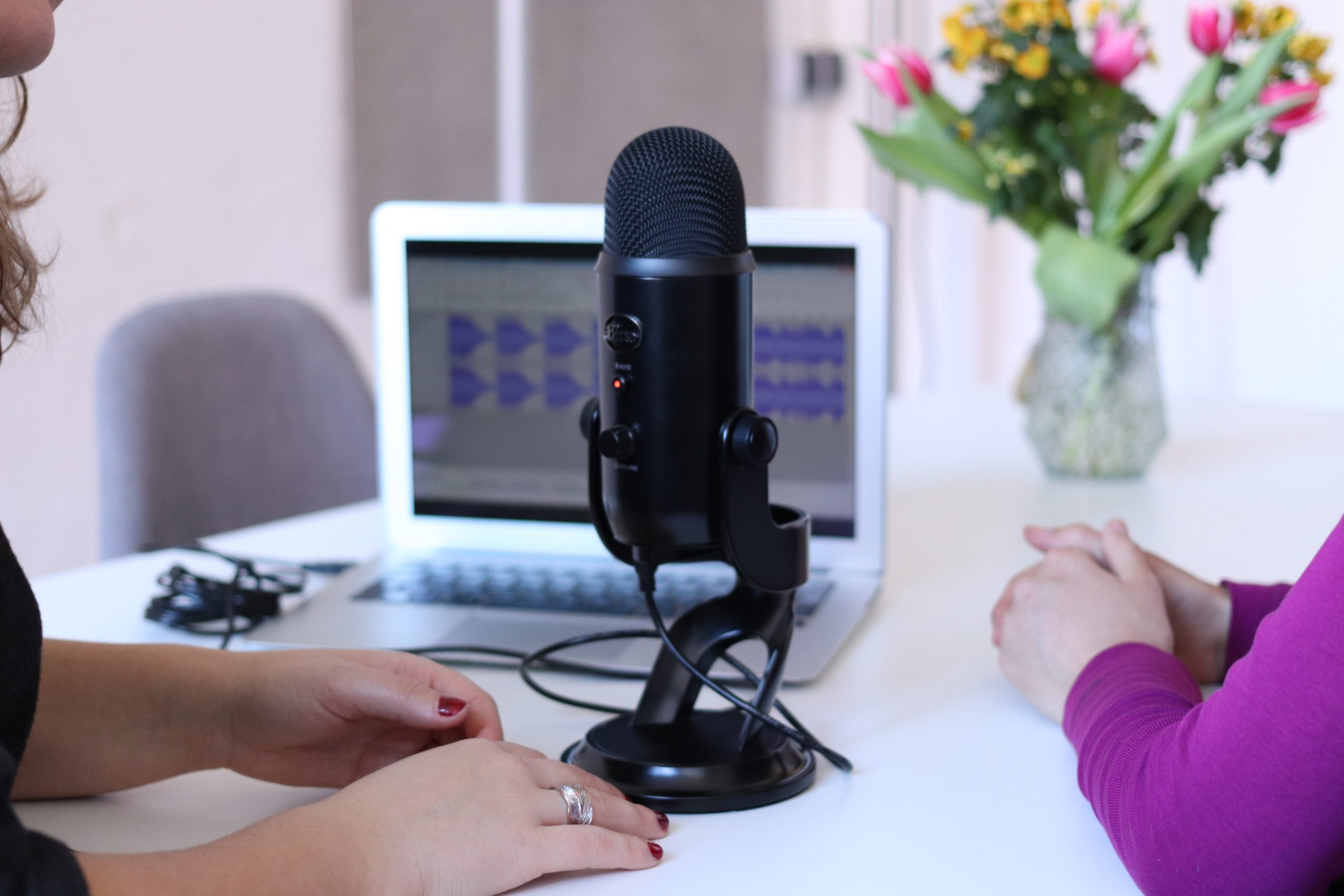Podcasts have continued to become one of the most accessible and proliferating entertainment mediums over the last couple of years.
Though, one Twitter user was not afraid to ask why this was so.
So many podcasts are just listening to regular people ramble about absolutely nothing and I don’t understand why so many people enjoy it 😭
— Jannifer Gao 🌶 (@Jani__Gee) April 24, 2022
Why are they a thing? And, not to mention, why are they such a popular thing right now?
Twitter user J. was curious as to why people would choose to spend their time listening to other people (who weren’t always qualified professionals) speak.

While mentioning that she was interested in what made people love podcasts so much, she was still firm in her preference of staying off the podcast train.
Someone offered the explanation that maybe it’s like the audio book of Twitter.
https://twitter.com/playlistkiller1/status/1518372212306329601
While another Twitter user joked about how focusing on one voice silenced all the other voices in their head.
Stops the rambling in my own damn head 🤣 pic.twitter.com/oCUYEAmMWK
— Goddess of Chaos 🇵🇸🇨🇩🇸🇩🇭🇹 (@Fatkilmonger) April 24, 2022
Other people genuinely answered the question, saying that they usually listen to podcasts as a type of background/white noise when doing things for a prolonged period of time like driving or doing household chores.
https://twitter.com/chattaknitter/status/1518412413602873349
I only listen when I’m doing chores, showering / getting ready, sometimes when I’m driving, before I go to sleep, doing my hobbies… stuff like that. Idk anyone who just sits and stares at nothing as they listen.
— Alex (@alexislexis333) April 25, 2022
Another user mentioned how some podcasts feel like a group hang session for whenever you need them the most.
https://twitter.com/FrancinaSimone/status/1518308287590338560
This thread also (apparently) made for the perfect avenue for people to shamelessly self-plug their own podcasts, hoping to entice podcast cynics to step into the mystical world of podcasts.
Me in the replies looking for podcast recommendations pic.twitter.com/HO8fjuJsZ6
— JAZMIN (@_MJC98) April 25, 2022
With so many podcasts present on different platforms, how can you stand out? How can you make people like Twitter user J. understand why people listen to your show?
Podcasts are easy to make just as they are easy to listen to. You don’t need to have any qualifications to start one, but there is a difference between creating a podcast and hosting a successful podcast.
Here are 5 tips that can help you create an effective podcast in a world where people are continuously learning about the power of podcasts.
Define your niche, define your audience
One reason there may be so many podcasts may be because there are just so many things for us to talk about—and so many ways to look at these many things.
If you’re going to be spending your time talking a bunch about something (either alone or with another person), then you might as well make it about something you love. Do your research on all the topics that pique your interest and find out what exactly about them you would want to discuss. Doing your research will help you be prepared and have a clearer direction for your episodes as well.
While completing your research, you may also want to define what an “effective” and “successful” podcast means to you. The meaning of “success” may be subjective depending on the person that you ask, so what does this word mean for you? Is it churning out a specific number of episodes? Having a certain someone on your show? Defining your short- and long-term goals will help you create strategies to achieve these—which can constantly be tweaked and revised along the way.
Finding your niche means finding your people. As someone that is interested in your niche, you can also get into the mind of your intended audience. What topics under your general theme would interest them? Who could you have as a possible guest on your show? What about your topic isn’t being spoken about enough?
You may think that the more specific your topic is, the more (seemingly) small your audience is, but once you find one person with the same interests, they may cause a chain reaction and continue to send your show to more and more likeminded people.
Your show should excite you; you should be discussing topics that you could go on talking about for forever—because this is almost exactly what you would be doing with a podcast. Even without seeing your face, listeners can detect when podcast hosts aren’t actually that invested in the topic they are talking about.
Keep it casual, keep it real
Remember the tweet that compared a podcast to hanging out with your friends? People may flock to a podcast because of a relatability factor of the topic and/or host. People came to hear you—so give them just that, you! This isn’t a formal presentation so you can use your own daily vernacular and slang. There’s no need to take yourself too seriously.
Engage your audience. Podcasts are a relationship between you and them (even if you can’t directly see each other), so make the most out of it. You wouldn’t have a show without your audience, they are a huge part of your podcasting journey so make them feel like they’re right beside you on the ride.
Practice makes perfect
Don’t let the fear of getting started prevent you from actually releasing that first episode. The more you record and listen to your past episodes equals the more you can learn what does and doesn’t work for you.
A bitter truth of starting a podcast is that unless you already have a huge following on other social media platforms, there won’t be that many people hearing your episodes in the early stages. But don’t despair! This provides you with the perfect opportunity to experiment with the format of your show and the way you run things. This will help you continue to deliver content that only keeps on improving the longer your show runs.
Find the line
It is important to get the input of your audience and hear their suggestions and comments on how you can improve your podcast / give them more of what they want, but it is also important to be the number one person who knows what’s best for your show. You should be able to make firm decisions on whether you will heed someone’s comment or if you feel it just really is not what your podcast is about at all.
Take as much control of your show as you can. This could even include limiting the lengths of your episodes. Remember that most, if not all, people who listen to podcasts are multitasking. Their attention is already divided, they can only hold it on your show for so long.
In line with this, it is also key that you find the perfect and sustainable routine that you can for your show. Having a sustainable recording and episode release routine will help you stay consistent. Consistency is key to keeping your core audience. Being consistent will help your audiences trust that you’ll deliver when you say you will, and it will also help them integrate your podcast into their own routines.
Don’t be afraid to collaborate
This is a useful tip to consider, especially if you are doing things alone. Don’t be afraid to reach out to other podcast hosts/producers if you need help or have a question to ask. The internet is also always there at your fingertips for you to shoot questions at day or night.
Make the most out of getting guests for your show, this will help you by bringing their audiences over to your podcast and giving them a sample of what you do. The same goes for the other way around. When going on the shows of other podcast hosts, don’t be shy to promote your own show either, and let your personality shine through.
If you decide to start a podcast, just remember that you have to be in it for the long haul. It takes time to build an audience through podcasting, so you’re going to have to stick with it for a while. The ease of creating your own podcast may be a contributing factor to why it seems easy to quit podcasting as well.
Consistency and passion need to be your best friends. Stay passionate and always remember your “why”. Whether you have a message to spread or just want to document some hilarious conversations; have fun and enjoy yourself. Usually, if you enjoy what you do, you tend to attract people in one way or another.
Other POP! stories you might like:
‘The KwenTeaHan Podcast’: Spilling the tea and embracing queerness
Beginner-friendly podcast suggestions to keep you company in lockdown




